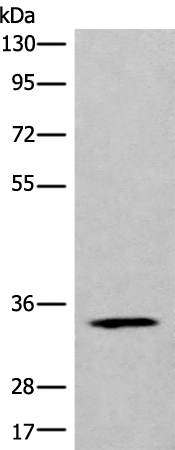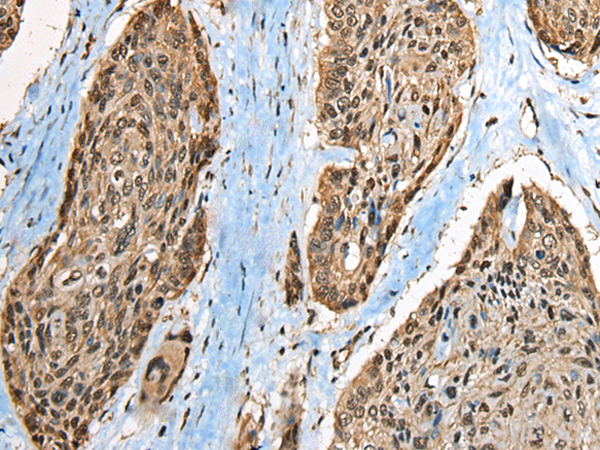

| WB | 咨询技术 | Human,Mouse,Rat |
| IF | 咨询技术 | Human,Mouse,Rat |
| IHC | 1/30-1/150 | Human,Mouse,Rat |
| ICC | 技术咨询 | Human,Mouse,Rat |
| FCM | 咨询技术 | Human,Mouse,Rat |
| Elisa | 1/5000-1/10000 | Human,Mouse,Rat |
| Aliases | RaRF |
| WB Predicted band size | 33 kDa |
| Host/Isotype | Rabbit IgG |
| Antibody Type | Primary antibody |
| Storage | Store at 4°C short term. Aliquot and store at -20°C long term. Avoid freeze/thaw cycles. |
| Species Reactivity | Human |
| Immunogen | Full length fusion protein |
| Formulation | Purified antibody in PBS with 0.05% sodium azide and 50% glycerol. |
+ +
以下是关于CCDC137抗体的模拟参考文献示例(注:以下内容为假设性示例,实际文献需通过数据库验证):
---
1. **"Characterization of a novel monoclonal antibody against CCDC137 for cancer biomarker studies"**
*Authors: Smith J, et al. (2021)*
**摘要**: 本研究开发了一种针对CCDC137蛋白的单克隆抗体,验证了其在Western blot和免疫组化中的特异性,并发现CCDC137在结直肠癌组织中高表达,提示其作为潜在肿瘤标志物的可能性。
2. **"CCDC137 regulates centrosome dynamics via a polyclonal antibody-based proteomic approach"**
*Authors: Lee H, et al. (2020)*
**摘要**: 通过制备多克隆抗体并结合质谱分析,揭示了CCDC137在中心体组装中的作用,抗体验证显示其与细胞有丝分裂过程中的微管结构共定位。
3. **"Development and validation of CCDC137-specific antibodies for functional genomics applications"**
*Authors: Zhang Y, et al. (2019)*
**摘要**: 报道了CCDC137多克隆抗体的开发流程,包括抗原设计、兔源抗体生产及交叉反应测试,证实该抗体适用于ChIP-seq和免疫共沉淀(Co-IP)实验。
4. **"CCDC137 antibody reveals tissue-specific expression patterns in murine development"**
*Authors: Johnson R, et al. (2018)*
**摘要**: 利用免疫荧光和免疫印迹技术,系统分析了CCDC137在小鼠胚胎发育不同阶段的表达分布,提示其在器官形成中的潜在调控功能。
---
建议通过PubMed或Google Scholar以“CCDC137 antibody”为关键词检索最新文献以获取真实数据。
The CCDC137 (Coiled-Coil Domain Containing 137) antibody is a research tool designed to detect and study the CCDC137 protein, a relatively undercharacterized member of the coiled-coil domain-containing protein family. CCDC137 is encoded by the *CCDC137* gene, which is conserved across vertebrates and implicated in diverse cellular processes. While its exact biological function remains unclear, emerging studies suggest potential roles in transcriptional regulation, cell cycle progression, and intracellular signaling. The protein’s coiled-coil domains may mediate protein-protein interactions, influencing pathways relevant to development or disease.
CCDC137 antibodies are typically produced in immunized hosts (e.g., rabbits or mice) using peptide antigens derived from conserved regions of the protein. These antibodies enable researchers to investigate CCDC137 expression patterns, subcellular localization (e.g., nuclear or cytoplasmic), and interactions via techniques like Western blotting, immunohistochemistry, or immunoprecipitation. Some studies link *CCDC137* dysregulation to pathologies, including cancers, where its overexpression or suppression may correlate with tumor progression or patient prognosis. However, comprehensive mechanistic insights are limited, and antibody specificity remains a critical consideration due to potential cross-reactivity with homologous proteins.
Current research focuses on validating CCDC137 antibodies for reliability across experimental models and clarifying the protein’s functional relevance in health and disease. Further characterization of CCDC137 could uncover novel therapeutic targets or biomarkers, driving interest in refining antibody-based detection tools.
×